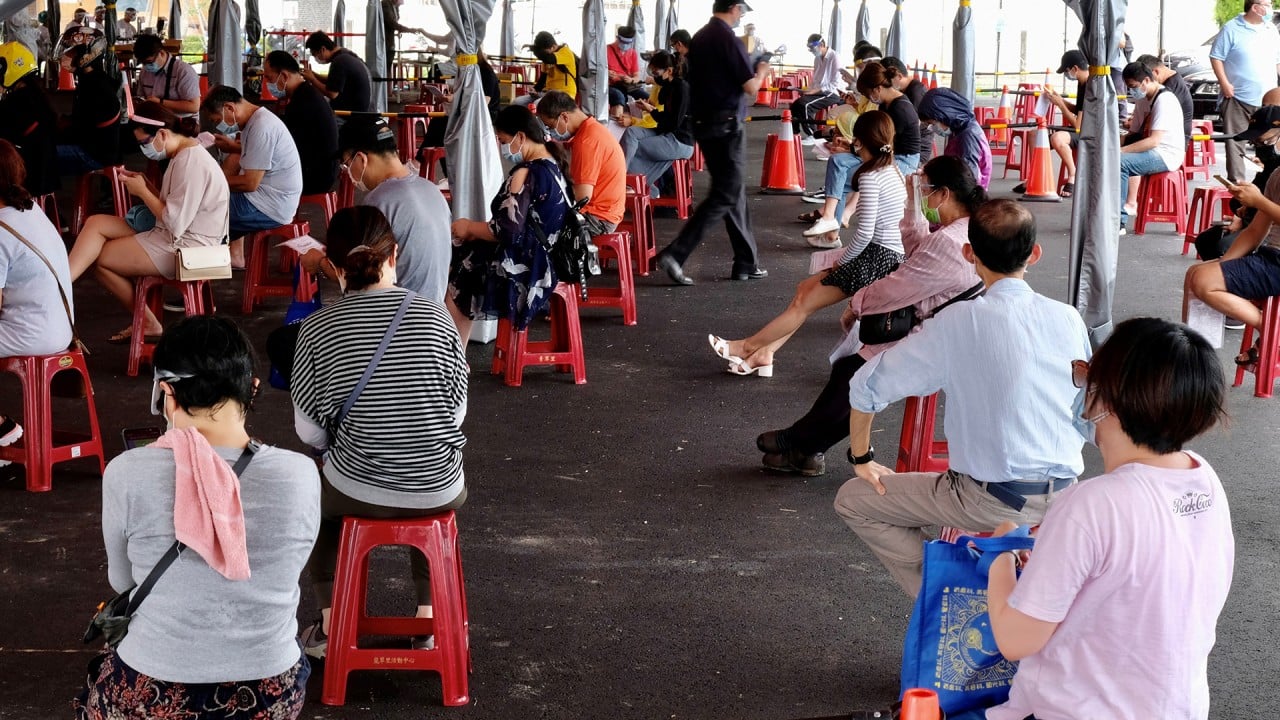
Open for business? The trouble with bringing down mainland China’s coronavirus travel barriers
- The country is racing to vaccinate the public and reach herd immunity to prevent imported cases getting a foothold
- But there is no sign that restrictions will ease for travellers any time soon, diplomats say
When the coastal province of Fujian announced at the end of April it would cut the quarantine required for some Taiwanese visitors, authorities hoped the example could test the water.
China’s great wall against transmission of the coronavirus from overseas had been in place since the early days of the pandemic.
For anybody trying to get into China, there are strict measures, including allowing only business travellers, and requirements for multiple negative Covid-19 tests and mandatory quarantines of between 14 and 21 days.
So far, 878.5 million doses have been administered in the country’s mass inoculation drive and China should reach its first phase target of vaccinating 40 per cent of the population, or 560 million people, by June 30. The next goal is to inoculate at least 70 per cent of the population – or almost everybody above the age of 15 – by the end of this year.
Feng Zijian, who recently stepped down as deputy head of the Chinese Centre for Disease Control and Prevention, told a health conference this month that whether China could resume a “normal” state of affairs depended on whether a high percentage of the population had been vaccinated.
Changes to prevention and control measures would not only depend on “considerations and decisions regarding technology” but also societal consensus and political decisions.
“The current goal is to get the entire population protected with vaccines, so that we are in a position and able to think about adjusting our strategy,” Feng said.
“We don’t foresee China opening borders soon with the pandemic still going on in much of the world and opening for the Winter Olympics is just a maybe,” a diplomat from an Asian country said. “Opening the borders is not only about whether China has achieved herd immunity through vaccination, but also about Covid-19 prevalence in other countries. It will be a reciprocal agreement.”
But it is not just about the Olympics. Nicholas Thomas, health security expert and associate professor at City University of Hong Kong, said China could not afford to be excluded from international trade and travel when North America and Europe reopened for business.
“If there are still excessive quarantine restrictions on entering or returning to China then businesses will look elsewhere. Remote communications are fine but people, as a general rule, prefer to develop business in person. China cannot afford to exclude itself from this process,” he said.
Another Asian diplomat said that, for example, long quarantine periods made it tougher for foreign businesspeople to do something as routine as a site inspection to check production complied with international good manufacturing practice standards.
Nevertheless, the strict containment measures have been popular in China. When the Fujian authorities announced the pilot plans for Taiwanese visitors, commenters were quick to condemn it online. “It’s insane to sacrifice the hard-earned success of epidemic control,” one Weibo user said.
Thomas, from City University, said the government risked losing domestic popularity by steering away from its strict Covid-19 control strategy.
“So it really comes down to where the Chinese leadership perceives is the greatest need or the greatest risk: from the virus or from the economy,” he said.
One option is to pilot a gradual change of prevention and control measures in “localised areas” after the country had vaccinated 80 per cent of its population, according to a National Health Commission official quoted by mainland magazine Caijing earlier this month.
But experts cautioned that a high vaccination rate would not completely eliminate risks.
Hsu Li Yang, associate professor at the Saw Swee Hock School of Public Health of the National University of Singapore, said that even if a country achieved herd immunity, it did not rule out cases or clusters. Instead, these clusters would most likely be “self-limited if they develop”.
Peter Chin-Hong, professor of medicine at the University of California, San Francisco, also said it would be impossible to eliminate all infections with herd immunity because of an unknown reservoir of the virus among animals that could be transmitted to humans.
Public health experts agreed it would be safer for China and other countries with a relatively low prevalence of Covid-19 to open up only to countries with similarly low levels of infection before they reach herd immunity.
“A country that’s controlled this well might be able to open up to other countries with low levels or the same if they are confident about it, but you can’t open up to the rest of the world until you have a large proportion of your population vaccinated,” said Peter Collignon, professor of microbiology at the Australian National University.
“There is a sort of false assumption from some countries that they can keep viruses out. I don’t think you can. Taiwan is an example of how things can be really under control and suddenly it changes all in a week or two.”
Kwok Kin-on, an assistant professor at the Chinese University of Hong Kong’s JC School of Public Health and Primary Care, said China should be conservative about opening the border because more data was needed to know whether the vaccines being used on the mainland blocked transmission of the coronavirus.
Clinical trials indicated that the vaccines could prevent symptomatic disease but more real-world results were needed, including about efficacy against variants, he said. Even a limited opening of the borders could involve longer quarantine periods of 21 to 28 days, multiple Covid-19 tests before and during the quarantine, or even the use of rapid antigen tests at border entry points, he added.
“If we had more data to prove that [the vaccines are] able to prevent the transmission of the virus, even for the variants, we could be more ambitious with border reopening because we would be confident that the vaccines are effective enough to prevent transmission within the local community,” Kwok said.
One country that could have a lesson for others is Israel, according to Hsu from NUS. Israel has vaccinated 60 per cent of its population and could be a litmus test if it reopened its borders.
Coronavirus: China’s plans for ‘vaccine passport’ may be hampered by lack of data, diplomats say
One diplomat from a country in talks with China to use such passports said the challenges included ensuring the authenticity of the certificates and finding a common technical platform for the information.
“It will take a long time but we hope we will have reached an agreement on the technical difficulties when both countries are ready to take that step,” the diplomat said.
However, with unbalanced vaccine supplies, a slow vaccination rate globally and “more transmissible and vaccine evading variants”, Chin-Hong said the world would probably never fully return to the pre-pandemic normal.
“Immunity passports will become de rigueur for travel and [travellers will have to] be prepared for closings of borders as outbreaks continue,” he said. “Just like we are used to adjusting our travel because of weather, we will undoubtedly need to consult regional Covid-19 reports and adjust our travel accordingly.”












